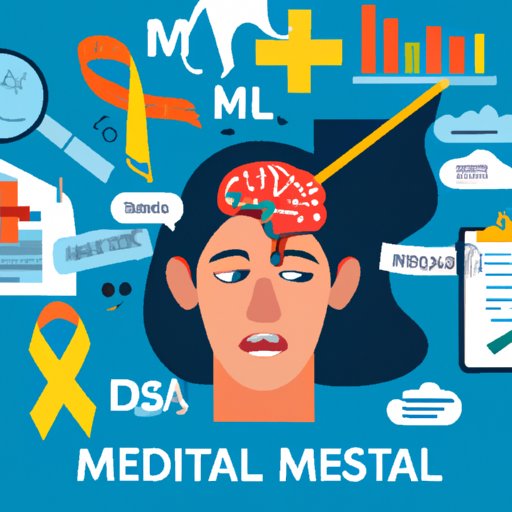Introduction
Mental health disorders can be difficult to identify and diagnose, leaving many people feeling frustrated and overwhelmed. However, it is possible to explore what mental health disorder you may have by looking at your symptoms and consulting with a mental health professional. This article will look at the process of diagnosing a mental health disorder, as well as provide tips on how to better understand your condition through self-reflection.
Diagnosing a Mental Health Disorder: What to Expect
If you believe you may have a mental health disorder, the first step is to consult with a mental health professional. During your appointment, you will likely be asked about your symptoms and medical history. The doctor may also ask questions about your lifestyle, such as how much sleep you get each night and how often you exercise. They may also inquire about any emotional or environmental stressors in your life.
Once the doctor has gathered all the necessary information, they may offer a formal diagnosis. This diagnosis will include the type of mental health disorder you have and any recommended treatment plans. It is important to remember that a diagnosis is not a final answer – it is simply a starting point for understanding your condition and taking steps towards recovery.
Understanding My Mental Health Disorder Through Self-Reflection
Self-reflection is an important part of the process of understanding your mental health disorder. Taking time to reflect on your thoughts and feelings can help you recognize patterns in your behavior, which can be useful in understanding your condition. Additionally, tracking changes in your mood over time can help you identify triggers that may lead to episodes of depression, anxiety, or other issues.
It is also important to take note of any stressors in your life. Stress can be a major factor in exacerbating mental health issues, so it is important to be aware of potential triggers and work to manage them effectively.

A Guide to Identifying Your Specific Mental Health Disorder
Once you have taken the time to reflect on your thoughts and feelings, it is time to start exploring what mental health disorder you may have. To do this, it is helpful to look at common symptoms associated with different mental health disorders. For example, depression is often characterized by feelings of hopelessness, low energy, and changes in appetite. Anxiety, on the other hand, is typically associated with feelings of intense fear and worry, as well as physical symptoms such as sweating and difficulty breathing.
It is also helpful to research different mental health disorders to gain a better understanding of the signs and symptoms associated with each one. Additionally, recognizing the warning signs of a mental health disorder can help you identify if you are experiencing any of these symptoms and take action to seek help.

Seeking Professional Help for Mental Health Diagnosis
While it can be helpful to identify potential mental health disorders on your own, it is important to remember that only a qualified mental health professional can offer an accurate diagnosis. When seeking a diagnosis, it is important to find a mental health professional who is experienced in treating the type of disorder you believe you may have.
When preparing for an appointment, it is helpful to make a list of any symptoms you are experiencing, as well as any questions or concerns you may have. Additionally, it is important to make an action plan for what steps to take after receiving a diagnosis. This could include seeking therapy, taking medication, or making lifestyle changes.
Conclusion
Exploring what mental health disorder you may have can be a daunting task. However, it is possible to gain a better understanding of your condition through self-reflection and seeking professional help. Consulting with a mental health professional can provide you with an accurate diagnosis and a plan for managing your disorder. Additionally, taking care of yourself mentally and physically can help you achieve a sense of wellbeing and a healthier lifestyle.
(Note: Is this article not meeting your expectations? Do you have knowledge or insights to share? Unlock new opportunities and expand your reach by joining our authors team. Click Registration to join us and share your expertise with our readers.)
